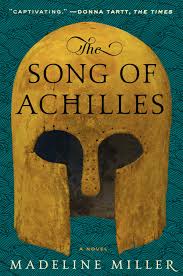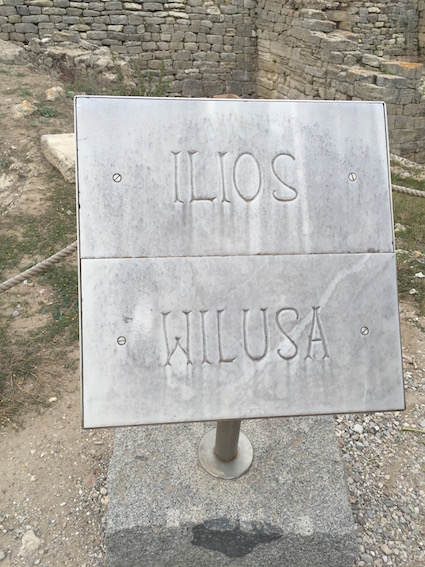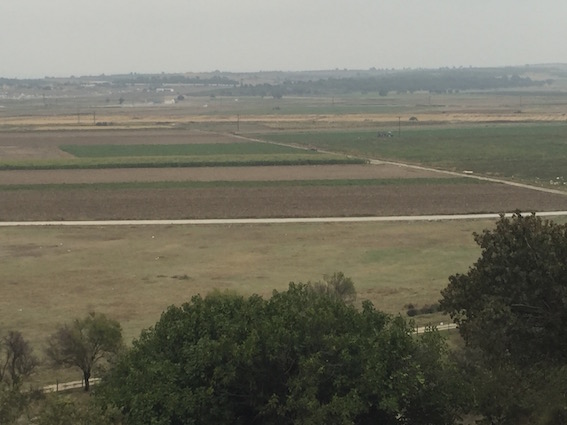This is the story of the boy Achilles and lifelong companion and true love Patroclus from their first meeting when both were eight, told from the point of view of Patroclus and set in a mysterious world. It is ‘mysterious’ because the gods are ever-present. Max Weber said the Enlightenment had gradually ‘demystified (Entzauberung) the world,’ that is, taken the mystery out of the world through rationality and science. Well, this novel is firmly set in a world that has not been demystified. The author handles both the gods and the men and women and the goddess, if that has to be said, quite well, and also their interactions. The prose is gorgeous and the conceptions of the principals is engaging.
I made the remark about goddesses because anyone familiar with the mythology knows that Thetis, the divine mother of Achilles, was one formidable goddess. Even the the king of the gods, Zeus, had been known to steer clear of her.

Patroclus is a foundling who pitches up at the home of Achilles’s mortal father, who takes in boys as future warriors. In a world ruled by the sword this is a wise precaution.
 We visited the site of Troy in October 2015.
We visited the site of Troy in October 2015.
 The view of the Trojan plain.
The view of the Trojan plain.
The descriptions of Achilles from boy to man are, well, Homeric, it has to be said. He is beautiful, he is graceful, he is simple in manner for there is no need for him to prove himself to himself or to anyone else, his senses are preternatural… he may work all day with sword and spear in practice and yet never seems to sweat. The abrasion of his hands on sword haft never raises a callous, and so on. Truly he is favoured by the gods.
The more so when Thetis appears, as she does, now and again and when least expected. The first time she appears to Patroclus, of whom she disapproves as unworthy to be a companion of the god-born Achilles is marvellously realised. (Ditto the last time.) The boy is walking along a mountain path when he realises all has gone quiet. The cicadas have stopped. The birds have left the sky. Even the leaves on the trees are still. The grass itself seems tense in expectation. And then…there she is, a combination of incredible beauty and searing hatred. To look at her burns his eyeballs, when she looks at him, his skin burns. Not a goddess to cross.
Though Thetis hides Achilles to spare him from the Trojan War, the wily Odysseus finds him. That is another story and it is partly re-told here afresh. She hid him among a large group of girls in female attire. Suspecting that Achilles was among these girls, Odysseus threw down a sword before them and the hand that snatched it up with blinding speed, that was the hand of Achilles. He was born to hold that sword, a reflex to grab it. The story is dressed up a little here but stays entirely faithful to the legends. Odysseus used some good old fashioned leg work to find the place where Thetis had secreted her darling boy before he got close enough to drop the sword.
There are some soft spots in the story. It is never clear to me why Achilles took up Patroclus. Achilles is asked this very question a couple of times and answers each time, but none made sense to this reader.
I also found it hard to reconcile this mild mannered Achilles with the butcher he became at Troy. Though the novel does deftly lay the groundwork to explain his double reaction at Troy, first to the loss of the girl Briseis to Agamemnon and then Hector’s murder of Patroclus. Though, strangely, regarding Briseis the author does not quote what Achilles says in the ‘Iliad,’ ‘I love her.’
Yes, Achilles knows the doom that hangs over him, and in time Patroclus learns it, too. But there is a shred of hope even amid these Western Front trenches at Troy, for the prophecy says that as long as Hector, the Trojan champion lives, so shall Achilles, i.e., Achilles will only die after Hector. Since Hector seems indomitable, Patroclus has hope that Achilles will survive, somehow. Patroclus is not a deep thinker.
Achilles faces his destiny and wades into the mayhem at Troy slaying this one and that by the dozen. He moves at five times the speed of even the most athletic opponents. Patroclus, never much a hand at athletics or warfare, stays clear of the fighting and becomes a healer, and there is much to heal. This I do not remember from the ‘Iliad.’ But the author made a choice for reasons of plot and character. So be it.
More than once ethical and moral matters rise to the surface, and are discussed by characters. The writer manages to do this without anachronism, not imputing to these men and women our Enlightenment ethos, nor condemning them for lacking it. Quite an achievement, this. Those that have not read the ‘Iliad’ do not realise how philosophical is that poem of force.
But fate is fate, and bad leads to worse.
 Madeline Miller is a high school teacher.
Madeline Miller is a high school teacher.
The novelist clearly shows that, to a degree, even within the ambit of the prophecy, Achilles is the author of his own fate. That is an achievement. Chapeaux!
Skip to content
